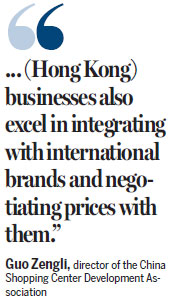Chow Tai Fook gets the ball rolling with Qianhai shopping complex
Updated: 2015-08-06 08:49
By Chai Hua in Shenzhen(HK Edition)
|
|||||||
Hong Kong-based Chow Tai Fook Enterprises Ltd (CTF) - controlled by the family of tycoon Cheng Yu-tong - has won the bid to build and operate the Qianhai (Hong Kong) Global Shopping Center.
Total investment in the facility, covering an area of about 11,000 square meters, is estimated at 300 million yuan ($48 million). The center is planned to have four floors offering 20,000 square meters of retail space and more than 200 parking lots.
The Qianhai Authority expects the complex to be completed by April next year, with 6,800 square meters of space available by the end of this year.
The center is programmed to be invested in and managed by Hong Kong people and enterprises.
Guo Zengli, director of the China Shopping Center Development Association, told China Daily that Hong Kong companies hold all the aces over their mainland counterparts in building and running such a facility. He said SAR businesses also excel in integrating with international brands and negotiating prices with them.
The shopping complex, which began attracting Hong Kong investments on July 15, will have a tentative duration of 10 years.
Qianhai Authority spokesman Wang Jinxia said their goal is to build up a shopping cluster in cooperation with SAR firms. "Chow Tai Fook is the first and more will be coming soon."
CTF executive director Adrian Cheng Chi-kong said the company will launch an innovative business model dedicated to providing excellent services in Qianhai.
According to industry insiders, New World China Land Ltd (NWCL) - the flagship mainland property arm of Hong Kong-listed New World Development Co Ltd - will run the center.
CTF has authorized NWCL to operate and manage many of its real-estate projects on the mainland, including that to be built on a plot of land in Wuhan, Hubei province, which the group bought for 1.5 billion yuan last month.
The Qianhai Authority said the shopping facility will establish an offline bonded product exhibition and trading store and an online e-commerce website which is expected to become a B2B2C (business-to-business-to-consumer) e-commerce platform.

Cheng said CTF is proactively developing its online business to explore new retail models: "Online sales account for 1 percent of our total revenue, but this is expected to rise to 2 to 3 percent gradually."
"The key to cross-border e-commerce is production sources. Online or offline is just a matter of channel. Compared with e-commerce companies, traditional entities have more advantages when they integrate business models of physical stores and e-commerce," Guo stressed, adding that the survival of stores would depend greatly on their prices.
"Specific taxation and customs policies must be carried out as soon as possible," he said.
Hua Tao, director of the Shenzhen Retail Business Association, agreed: "Whether Qianhai can establish a successful tax-free shopping mall of overseas products will depend on the implementation of tax exemption policies."
Mainland customs normally levy a 17-percent value-added tax on imported goods. But, daily necessities, including baby products, are only levied 10 percent postal tax in the Qianhai bonded zone. Thus, these categories have become the main products of other shopping centers in the area.
Four stores that import goods have opened their doors in Qianhai, including the latest eWJ Shop - which was set up by China Resources Vanguard and China Merchants Holdings (International) Co Ltd.
These stores have also started online businesses because, under the cross-border e-commerce model, products with import duties of less than 50 yuan are exempted from taxes under the mainland's trade preferential policy.
grace@chinadailyhk.com
(HK Edition 08/06/2015 page8)